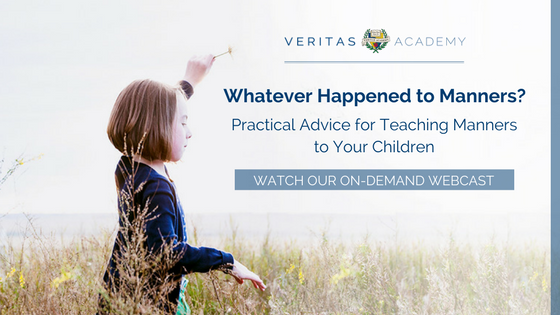“Utensils should not be propped against the side of your plate like an oar.”
“You use silverware in the order that it is placed in front of you, from the outside in.”
“Never put your napkin back on the table during the meal after you’ve used it.”
When we hear the word etiquette, most of us immediately think of table manners: something necessary for us to pull out of the recesses of our minds when we’re at a dinner party, or perhaps when we’re in the presence of a famous or wealthy person. Etiquette, however, has a much deeper significance than just being a set of rules that might help boost your social standing.
When I was a student at Veritas, I went to my fair share of etiquette dinners (goodness knows I needed them). Even as a rambunctious, distractible, self-important middle-and-early high schooler, I found value in these dinners, and kept stereotypical pre-teen ridicule to a minimum. In fact, if my arm were to be twisted, I would admit that I actually liked them. Perhaps subconsciously, I understood that etiquette affected my feeling of preparedness for different circumstances, even outside the scope of dinner parties. Though there was no concrete point when I would need to utilize the directives I was learning, I gained confidence.
Even as a rambunctious, distractible, self-important middle-and-early high schooler, I found value in these dinners, and kept stereotypical pre-teen ridicule to a minimum. In fact, if my arm were to be twisted, I would admit that I actually liked them. Perhaps subconsciously, I understood that etiquette affected my feeling of preparedness for different circumstances, even outside the scope of dinner parties. Though there was no concrete point when I would need to utilize the directives I was learning, I gained confidence.
Learning etiquette did not just manufacture a more prepared and confident Jesse. I also had the opportunity to be a part of the flagship Veritas Ambassador team, the purpose of which was to help welcome guests and give tours. For further development, the members of this team were sent to several special sessions of etiquette training. Through those sessions I truly learned that etiquette was about more than just table manners — it was about how you presented yourself to others in every situation. Looking a new acquaintance in the eye when you shake their hand, referring to a person by name, and respectful posture were things that became of utmost importance.
In Classical Education, the Rhetoric stage is the final stage of learning. An adjective that can be attributed to this stage is polishing. The Rhetoric stage encompasses so much more than simply polishing a student once they’re nearing the end of their high school journey, although learning rhetoric, studying apologetics, and tackling senior thesis are all things that do help polish the student to ready them for the next step. Though the Rhetoric stage polishes students, it’s really about synthesis — students have been taught facts in Grammar stage, and students have learned how to reason in the Logic stage, but they need something to bring it all together. Rhetorical synthesis is about the fusion of truth, goodness, and beauty, as well as all the subjects
that the student has previously studied.
Similarly, etiquette is the synthesis of one’s actions, one’s demeanor, and one’s relation to others. Etiquette affects who you are, not just what you do. In fact, etiquette is an integral part of the Rhetoric stage of learning; without it students miss a vital piece of education. Though we might not all be foreign dignitaries eating at fancy dinner parties, with etiquette we can better represent our education and (Lord willing) our God.






